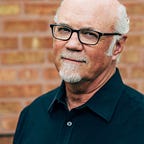What Mary Oliver Taught Me
And what poetry can teach a writer of prose.
Many year ago I had the opportunity to write inside an old abbey in the English countryside. It was part of a university MFA program. We were a small cohort of writers—fiction, creative nonfiction, and poetry. I was the memoirist. One of just three. Five others were fiction writers. And the poets numbered around four, if I remember correctly.
The fiction writers said the creative nonfiction writers had the hardest job, writing about themselves. So daunting, they would say. The creative nonfiction writers were terrified of what fiction writers regularly did—made things up. Something many of us couldn’t imagine. And the poets, well, they were different in all ways, at least to my observation. The poets weren’t afraid of anything. They were fearless, incredibly observant, and strikingly inventive. They smoked more cigarettes than anyone else in the group. They tended to stay to themselves. They carried around notebooks everywhere. They were always writing. I fell in love with the poets.
But back then, most poetry escaped me. Many times I would find it difficult to decipher and comprehend. I loved Dylan Thomas but wasn’t sure why. Keats was the same. But then I found Billy Collins, one of the most accessible poets in the world. If you haven’t already, you must read at least these two poems: “The Dead” and “The Best Cigarette.” Reading his words opened the doors to poetry for me. Much of it now began to make sense.
One evening, all of us from the abbey ended up at a local pub up the road to read some of our writings to the locals over a number of pints. It was there that I confided in one of the cohort’s poets about my recent awakening. He asked if I had ever read Mary Oliver. He knew I was a lover of walks and nature, of the wild world, of streams and trees, of rivers and mountains. No, I hadn’t, I said. I had never heard of Oliver, but was afraid to admit it.
A week later after arriving back in the U.S., I purchased Oliver’s Why I Wake Early. The poems were sublime. Every stanza gave me such joy and gladness. I read them over and over. Her words stayed with me.
But this was not just another poetry awakening.
What I began to see in Oliver’s poems was how her craft, the way she employed words and images could be part of my own prose work. I could write prose with the heart of a poet. Why not? I could learn to incorporate Oliver’s observational skills and her acute attention to detail into my own work, my sentences, my essays. Mary Oliver listened to the world in ways that I had never considered. Poetry, and especially Oliver’s poetry, places emphasis on communicating through sensory language, an economy of words, and rhythm. It was after reading her that I started regularly reading my prose out loud. I paid attention to singular words, studied how each might fit perfectly into a sentence like a brick in the construction of a big, beautiful home, every single one having its own glorious purpose.
Dylan Thomas made me curious, Keats made me cry, Billy Collins embraced me, but Mary Oliver made me see what was possible.
“Pay attention. Be astonished. Tell about it.” —Mary Oliver.
